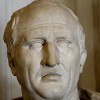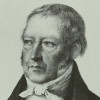“ If we regard Evil as possessing a fixity of its own, apart and distinct from Good, we are to a certain extent right: there is an opposition between them: nor do those who maintain the apparent and relative character of the opposition mean that Evil and Good in the Absolute are one, or, in accordance with the modern phrase, that a thing first becomes evil from our way of looking at it. ”
Georg Wilhelm Friedrich Hegel, Science of Logic (1816). copy citation
| Author | Georg Wilhelm Friedrich Hegel |
|---|---|
| Source | Science of Logic |
| Topic | opposition evil |
| Date | 1816 |
| Language | English |
| Reference | |
| Note | Translated by William Wallace |
| Weblink | http://www.gutenberg.org/files/55108/55108-h/55108-h.htm |
Context
“Necessity, again, in the ordinary acceptation of the term in popular philosophy, means determination from without only,—as in finite mechanics, where a body moves only when it is struck by another body, and moves in the direction communicated to it by the impact.—This however is a merely external necessity, not the real inward necessity which is identical with freedom.
The case is similar with the contrast of Good and Evil,—the favourite contrast of the introspective modern world. If we regard Evil as possessing a fixity of its own, apart and distinct from Good, we are to a certain extent right: there is an opposition between them: nor do those who maintain the apparent and relative character of the opposition mean that Evil and Good in the Absolute are one, or, in accordance with the modern phrase, that a thing first becomes evil from our way of looking at it. The error arises when we take Evil as a permanent positive, instead of—what it really is—a negative which, though it would fain assert itself, has no real persistence, and is, in fact, only the absolute sham-existence of negativity in itself.”
source


